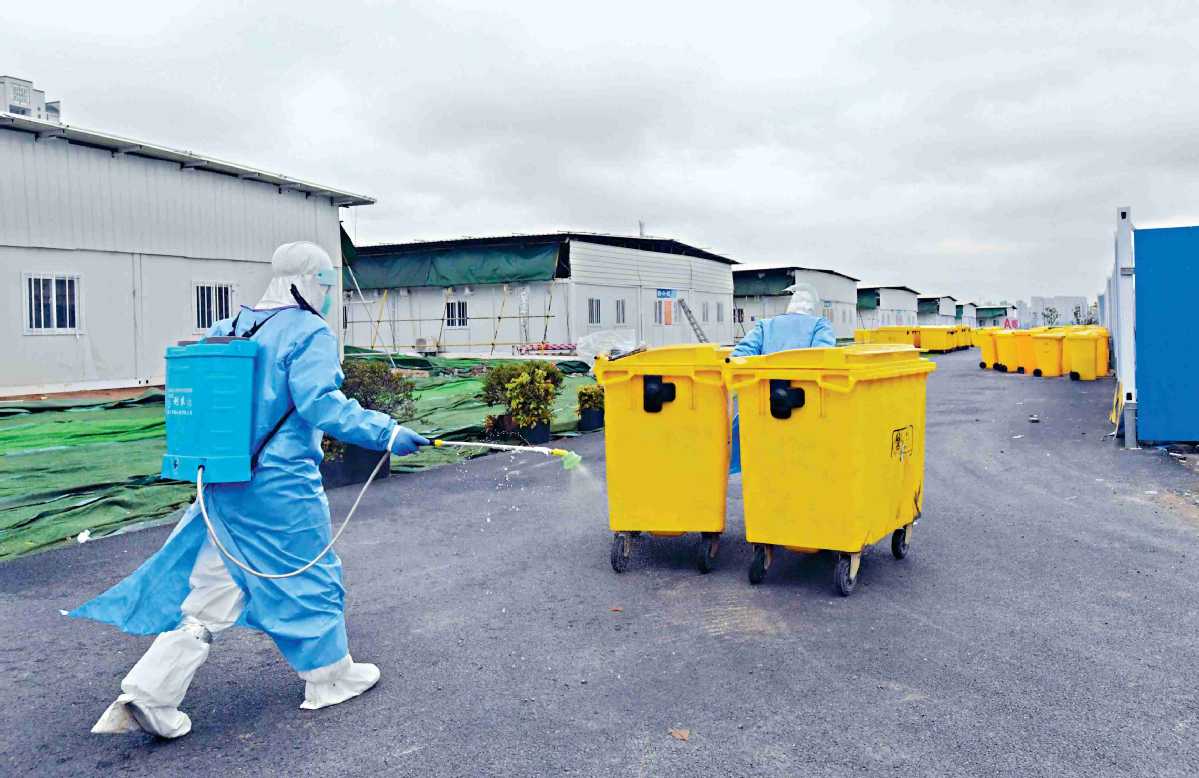Medical waste disposal brings challenges, big opportunities
By Liu Yukun | China Daily | Updated: 2020-04-21 09:26

Single-use items cause biohazard issues and create huge demand amid outbreak
Discarded masks, gloves and protective gowns are just some of the coronavirus-contaminated waste burdening treatment centers, thus spurring more market demand for proper hazardous-waste treatment strategies.
Protective gear is essential to help protect from COVID-19 infection, but single-use items create huge amounts of waste that may cause secondary infections to those coming in contact with them.
Contagion-tainted garbage should be treated as medical waste and thus should be disinfected and incinerated at designated treatment centers to avoid secondary infections, said Li Suying, a Beijing Youan Hospital doctor once sent by the National Health Commission to Wuhan to help contain the outbreak.
Compared with normal medical waste, coronavirus-tainted medical waste handling procedures have stricter requirements during collection and transport processes. These include doubling packaging layers, using special recycling boxes and urging staff to take preventive steps such as wearing masks and goggles, said Lei Ming, executive director and general manager of CECEP Ecotech Co Ltd, a company involved in coronavirus-related medical waste treatment.
Lei said the safest way to dispose of such garbage is to burn it at temperatures of 850 C in designated incinerators that have good emission treatment systems to ensure the emissions won't do further harm to the environment or people nearby.
Another company involved in coronavirus medical waste treatment, Shanghai Environment Group Co Ltd, handles such garbage on-site before using mobile technology to transport it back to disposal sites.
For medical waste that cannot be disposed of on-site, the company packages it in double-layers after disinfection, seals it in pressure-resistant packaging and then transports it at low temperatures for disposal.
Beijing Dabaisha Environmental Protection Technology has been using its technological strengths to provide hard-hit regions with mobile equipment for on-site treatment, with no need to transport the medical waste back to treatment centers, according to Xinhuanet.com.
The company said the method is helpful in reducing the risk of secondary infections by eliminating the transport process.
On-site treatment using mobile equipment has become a valuable asset for current medical waste treatment centers as many were burdened with waste, according to Zhao Qunying, director of the emergency management office of the Ministry of Ecology and Environment.
To cope with the problem, the central government deployed 46 mobile medical waste handling facilities, Zhao said at a news conference in March.
"Currently the national average operating load rate of medical waste treatment facilities is around 50 percent of total capacity," Zhao said.
From Jan 20 to April 11, about 256,000 metric tons of medical waste were handled across China, said the Ministry of Ecology and Environment.
As of April 11, China's daily medical waste disposal capacity stood at 6,062.4 tons, an increase of 1,159.6 tons before the epidemic, according to the ministry.
Daily medical waste treatment capacity in Hubei rose from 180 tons before the outbreak to 667.4 tons, and Wuhan's daily capacity increased from 50 tons before the epidemic to 265.6 tons by April 11.
China's ability to handle medical waste may see further improvements with an impending work plan from 10 ministry-level authorities aimed at boosting medical waste treatment facilities.
The work plan stated that by the end of this year, each prefectural-level city or above should have at least one medical waste treatment center that meet government requirements.
By June 2022, every county and city across China should have a medical waste treatment center, as required by the work plan.
While the government steps up efforts to promote the medical waste treatment sector, investors are also seeing business opportunities.
Jiangsu Rainbow Heavy Industries Co Ltd announced in March that it acquired a 73.36 percent stake in Hubei Zhongyou Youyi Environmental Protection Technology Co Ltd, which treats medical waste. Youyi was praised by the Ministry of Ecology and Environment for its contributions in battling the contagion.
Guosheng Securities Co Ltd said the acquisition offers Jiangsu Rainbow an entry into the hazardous waste treatment industry, which enjoys high gross margins.
The pandemic allows many listed companies to see that the medical waste treatment sector is relatively stable in terms of assets and income, and it boasts many business models, according to Pan Gong, a researcher affiliated with the E20 Environment Platform.
Pan said some listed companies, especially State-owned enterprises, may have a need for such assets." (Medical waste treatment) is actually a very high-quality asset for listed companies, especially State-owned companies," Pan said, adding that letting listed companies manage smaller medical waste treatment businesses also helps to form a more regulated industry.























